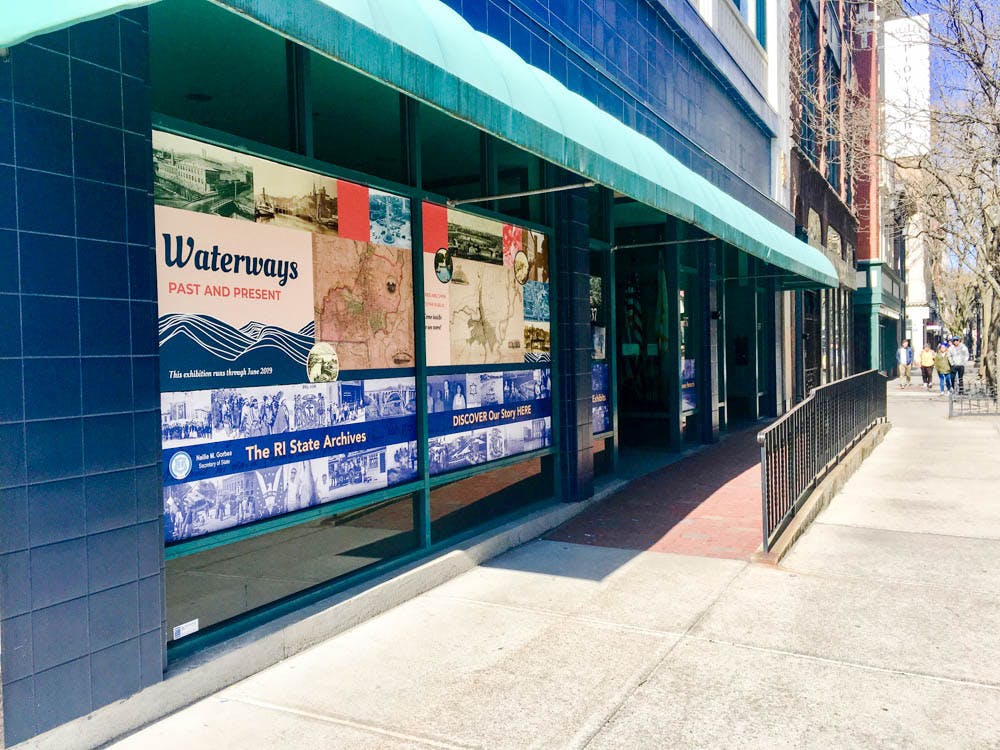Tucked away in an unassuming blue-tile clad building on Westminster Street is the Rhode Island State Archives, home to hundreds of years of state documents and legal records. Behind the building’s plain-looking door, the University’s original charter from 1764, a royal decree signed by King George III and one of the original thirteen copies of the Declaration of Independence signed by John Hancock himself can be found among the Archives’ treasures. While these documents are currently housed within a single jam-packed floor, Rhode Island Secretary of State Nellie Gorbea has big plans to transform the building into a tourist attraction, drawing visitors from across the state and beyond.
The Archives are currently housed in what was supposed to be a temporary location — but it’s been there for twenty years, Gorbea said. “When I first came into office five years ago, we had to immediately jump into renewing the lease.” But that move made Gorbea start questioning the benefits of the current location — which lies in a geographic flood zone — and she began to consider building a better facility.
In addition to a small exhibit space, this “temporary” location contains the “vault,” which has regulated environmental conditions to preserve particularly old and precious archives, as well as boxes upon boxes of other state records.
To move forward with a new State Archives, the Department of State completed a needs assessment study, reached out to other entities in the state that might benefit from the new Archives and executed a feasibility study as well as a Site Selection Study in 2018. As archival facilities necessitate specific mechanical, electrical and plumbing systems as well as certain climate and light controls, the state department concluded that building a new facility would be more cost effective than re-fitting an old one, Gorbea said. After narrowing the location down to Providence, Gorbea’s first choice for the new Archives is the vacant plot of land diagonal from the State House. With this location, she hopes to gain foot traffic from students on field trips to the State House. “We already have 10,000 students coming to the State House for State House tours,” she said, and “the most expensive part of the school field trip is the bus,” so enabling students to visit both buildings in one trip would ensure maximum accessibility.
The proposed 52,000 square foot facility would house a large exhibition space on the ground floor alongside a multi-use meeting space, with floors above housing the Archives in an environment with the adequate climate, lighting and security controls for the preservation of the documents. The new building will consolidate records from cities like Providence and other communities, making research easier for students and scholars. The new Archives “would be a place where any historical document of a government, whether local or statewide, would have a home,” Gorbea said.
The building would also serve as an “anchor of historic tourism” in the state, as well as an event space and venue for conferences, meetings and other events, Gorbea added.
The state’s feasibility study estimates this new building would cost about $52 million dollars. According to the Providence Journal, Gorbea requested $5 million in next year’s state budget to design the building and the rest of the money spread out over the following four years; but, it remains to be seen whether the funds necessary for this kind of project will be provided, or if the secretary will have to settle for a different location.
Utilizers of the Archives, such as Seth Rockman, Associate Professor of History, said he worries that it will be difficult to beat the Archive’s current location. Right down the street from Kennedy Plaza, “every single bus line in Rhode Island serves it, and they’ve also done a very good job of having two hour free parking in a lot right down the street,” Rockman said. “I don’t think it would be possible to have a more accessible location.”
But, the benefits of having more space and a possible location near the State House are enticing for individuals like Ken Carlson, reference analyst at the State Archives. “We really don’t have room to display or have many people come in,” he said.
The range of visitors to the Archives match the range of their contents, Carlson said. “We get all kinds of people,” he added. From studying campaign finance laws to dual citizenship, “it all depends on what’s blowing in the wind.” Many visitors are genealogists coming to look at censuses and familial records as well as historical researchers and people doing business in the state — studying property lines, zoning and lawsuits about real estate.
Despite the breadth of visitors the Archives attract, “it’s a small facility, it was meant to be temporary,” Carlson said. “This location, if they can get it near the State House, is even better, it’s the best possible place for it.”
With over ten million records dating back to 1638, including centuries of legislative records, the Archives and the information they contain “matter a lot to contemporary lawmaking,” Rockman said.
But many of the Archive’s visitors likely remain ignorant that the “vault” is a “treasure trove of documents,” Gorbea said. Its contents extend “to things like one of the thirteen original hand done copies of the Bill of Rights,” and “amazing documents like those signed by Aaron Burr and Alexander Hamilton,” she added.
“Rhode Island holds a very important part in the making of this country, because it is the birthplace of freedom of religion, separation of church and state. Any question you might have about a decision that the (state) government made, you could probably come close to finding an answer in here,” Gorbea added.
“The State Archive is an amazing repository for not just things that reflect law making at the top in our state and the colony that preceded statehood, but really for everyday life of common people,” Rockman added, referencing the thousands of petitions maintained in the Archives that constituents filed to the state legislature during the eighteenth and nineteenth centuries. These documents detailed various aspects of their lives.
Since her election five years ago, Gorbea has been working to find a new home for the Archives that celebrates its contents, given the documents’ importance in highlighting Rhode Island’s history and their role in ensuring government accountability. “Historically, people look at archives as a history project place,” Gorbea said. But they’re also about “government accountability and transparency. Having a well-designed archival center that’s also an exhibition center for Rhode Island history can serve those dual purposes much better than where we are right now, which is just an office space,” she added.





